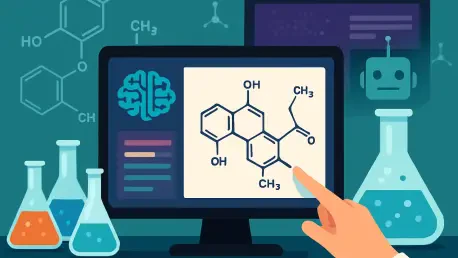In an era where technology continuously reshapes scientific disciplines, ChemXploreML emerges as a groundbreaking innovation bridging the gap between chemistry and machine learning. Developed by MIT’s McGuire Research Group, this application offers chemists a unique opportunity to predict molecular properties without delving into complex programming. The power of machine learning, once reserved for those with advanced technical skills, is now at the fingertips of chemists thanks to ChemXploreML’s user-friendly interface, designed to operate offline to ensure the confidentiality of research data.
Democratizing Machine Learning in Chemistry
A User-Friendly Approach to Complex Calculations
ChemXploreML stands as a testament to the democratization of technology, tailored for chemists who may lack advanced computational skills. The application’s intuitive interface alleviates the need for costly and time-consuming traditional methods for predicting molecular properties like boiling and melting points. This shift not only expedites the research process but also significantly reduces costs associated with extensive laboratory experiments. By automating the conversion of molecular structures into numerical data through innovative molecular embedders, the application provides an accessible platform for chemists to apply machine learning without the boilerplate technical hurdles.
The underlying technology relies on robust algorithms capable of delivering impressive accuracy in property prediction. For instance, the application has demonstrated up to 93 percent accuracy in anticipating critical temperatures. These achievements are particularly attributable to a cutting-edge molecular representation method known as VICGAE. Not only is VICGAE nearly as precise as traditional models, but it also operates with increased speed, enhancing the efficiency and practicality of ChemXploreML. For chemists eager to expedite the discovery of new materials and medications, this application presents a valuable tool.
Breaking Down Traditional Barriers
Traditional methods of predicting molecular characteristics often required specialized knowledge and resources that were not readily available to all chemists. The introduction of ChemXploreML marks a departure from these methods, making sophisticated computational techniques readily accessible to a broader scientific community. This transition is emblematic of a broader trend in technology where advanced tools are being developed with a focus on inclusivity and ease of use. ChemXploreML mitigates the barrier posed by technical jargon, allowing chemists to focus on innovation rather than the intricacies of programming.
Moreover, by enabling chemists to conduct calculations offline, ChemXploreML addresses concerns regarding data privacy. This feature is crucial as it ensures that sensitive research data remains confidential, which is especially important for proprietary or highly competitive studies. In this way, the application not only enhances accessibility but also successfully addresses the critical issue of data security inherent in digital tools and machine learning applications.
Advancements and Future Implications
A Step Forward in Scientific Research
The significance of ChemXploreML extends beyond its immediate application, hinting at myriad possibilities for future advancements in scientific research. By providing a platform where complex computations are simplified, this application encourages the exploration of innovative ideas and accelerates the pace of discovery in chemical sciences. The ease with which chemists can apply machine learning offers a unique combination of cutting-edge technology and practical application. This synergy supports a culture of experimentation and agility within chemical research environments, where groundbreaking discoveries are just as valuable as the methods that make them possible.
The adaptability of ChemXploreML’s framework is another pivotal aspect, as it allows for seamless integration with emerging technologies and methodologies. This adaptability facilitates continuous improvement, enabling the application to remain relevant amidst rapid technological changes. As the landscape of chemical sciences evolves, ChemXploreML is poised to accommodate new research challenges, potentially influencing how chemists approach problem-solving in the future.
Pioneering a New Era of Collaboration
The introduction of ChemXploreML signifies more than just a technological leap; it heralds a new era of collaboration and cross-disciplinary innovation in the sciences. By simplifying machine learning, it opens the door for collaboration between chemists and researchers from fields such as computational science and data analytics. This fosters a diverse exchange of knowledge, where insights from various disciplines can contribute to holistic and revolutionary chemistry solutions.
Additionally, by empowering researchers with varied backgrounds to leverage machine learning, ChemXploreML nurtures a collective approach to scientific challenges, promoting diversity of thought and expertise. This environment not only enhances innovation but could redefine the norms of scientific research, placing collaboration at the forefront. By bridging the gap between specialized computational techniques and practical applications, ChemXploreML not only advances the immediate goals of current research but also lays the groundwork for future multidisciplinary ventures.
A New Dawn in Chemical Sciences
In today’s rapidly evolving technological landscape, scientific fields are being continually transformed. In this context, ChemXploreML stands out as a revolutionary innovation that connects chemistry with the power of machine learning. Created by the McGuire Research Group at MIT, this cutting-edge application empowers chemists by allowing them to predict molecular properties without needing to master intricate programming skills. Historically, the significant benefits of machine learning were limited to individuals with deep technical expertise. However, ChemXploreML democratizes these tools, offering a user-friendly interface that places them directly in the hands of chemists. Importantly, the application is designed to function offline, assuring the privacy and security of research data—a critical concern for many in the field. With ChemXploreML, the gap between chemical research and machine learning continues to narrow, opening up new possibilities for scientific advancement and innovation in chemistry.









